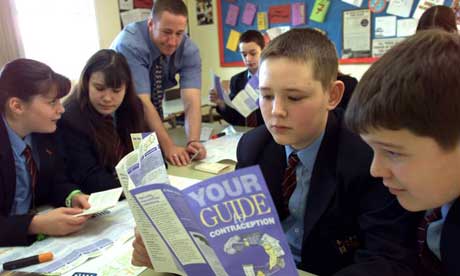Children under 15 can be withdrawn from sex education
Parents will be able to withdraw their children from the new, compulsory sex education lessons up to the age of 15.

A teacher giving a sex education lesson to pupils at Ivy Bank School, Burnley. Photograph: Don McPhee
Parents will have the right to withdraw children up to the age of 15 from sex education classes even though the subject is being made compulsory in primary and secondary schools, the government said today.
From September 2011, the law will change to make it compulsory for all young people in England to learn about sex between the ages of 15 and 16, even if their parents object. Parents currently have the right to withdraw their children from sex education classes up until the age of 19.
All schools will have to teach personal, social, health and economic education to pupils from the age of five. This will mean that faith schools will be forced to teach about homosexuality, civil partnerships, divorce and abortion. Five-year-olds will learn about different kinds of relationships, how to manage their emotions and the physical changes to their bodies in childhood.
Until now, schools have had to teach only the fundamentals of reproduction, contraception and puberty in science lessons.
Under the new law, parents who wish to exclude children from sex education will be allowed to do so if the children are 15 or under. The government said that 0.04% of pupils were thought to be withdrawn from sex education classes, usually on religious grounds.
Safer-sex campaigners predicted that the change in the law would help to tackle Britain's teenage pregnancy rate, which is one of the highest in Europe.
Simon Blake, national director of Brook, which provides advice on sexual health for under-25s, said: "Every day we see young people whose education about relationships and sex has not been good enough." He said "good-quality" sex education guaranteed through a statutory curriculum "is long overdue and will make a huge difference to young people".
Gill Frances, chair of the Teenage Pregnancy Advisory Group, said: "We believe this is the biggest single step that can reduce teenage pregnancy rates. Evidence shows that sex and relationships education help young people to delay early sex and make healthy choices when they eventually do become sexually active."
Julie Bentley, chief executive of the Family Planning Association charity, said: "This is a sensible and responsible decision that will have a profoundly positive impact on the sexual health and well-being of all our young people for generations to come. The government must be congratulated for taking this bold step."
Starting sex education in primary school would lead to children being "gently introduced to some very simple facts so they'll be ready to learn about complicated issues like puberty, relationships, sex and looking after themselves when they're older," she said.
Teachers in religious schools will still be free to tell pupils that sex outside marriage, homosexuality or using contraception are wrong, because the legislation will include a clause allowing schools to apply their "values" and "ethos" to lessons.
Faith schools will be allowed to deliver the lessons in line with the "context, values and ethos" of their religion, the legislation will say.
A spokesman from the the Catholic Education Service for England and Wales said PSHE was "vital". He said: "It enables factual information from reliable sources to be communicated and misinformation from peers or street culture or exploitation to be avoided. While disappointed that legal encumbrances mean that a blanket right of withdrawal can no longer apply, we are pleased that the government has recognised that the right of withdrawal in formative years is most critical and is therefore providing for the ability of parents to opt out of SRE up to the age of 15.
"We will continue to firmly uphold the position that parental rights remain vital, particularly but not exclusively in those most formative and critical years up until the age of 15. As age and growing independence brings young people ever closer to pressures, advertising and coercion to behaviour that can undermine the healthy life of young people, we are comforted in the knowledge that our schools and colleges will do an exceptional job in providing sex and relationships education, set within the teachings of the Catholic Church."
Ed Balls, the schools secretary, said: "Every young person will receive at least one year of sex and relationship education before their 16th birthday. The issues that personal, social, health and economic education cover are all central to children and young people's well-being and to their healthy development as they grow up."
The legislation comes after a government-commissioned review by Sir Alasdair Macdonald, headteacher of Morpeth school in east London, on how to make PSHE compulsory, which finished last summer. This found that sex education was patchy, given insufficient attention by some schools and failed to meet young people's needs.
The review was followed by a government-commissioned poll of 1,791 adults and 1,661 parents into whether all pupils should be taught about sex, and consultations with faith groups. A fifth of the parents said parents should never be able to withdraw their children from sex education lessons, whatever age the children were. A third said parents should be allowed to exclude their children from sex education classes if they were aged 11 or under.
As part of the legislation, children will also be taught about drugs and alcohol, how to tackle cyber-bullying, resist pressure to join gangs and manage their bank accounts.